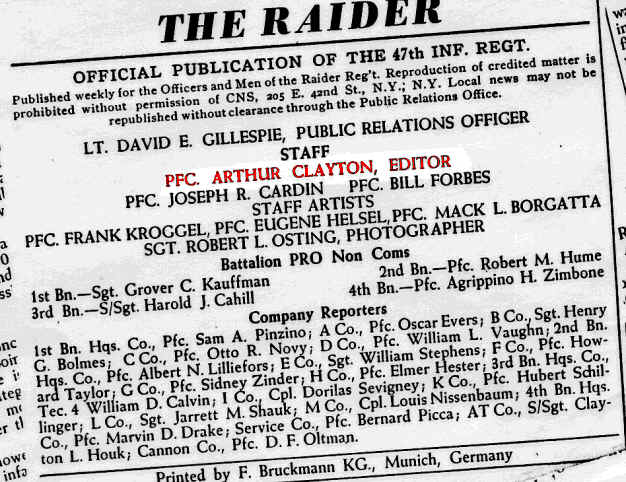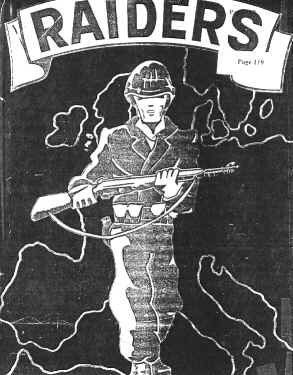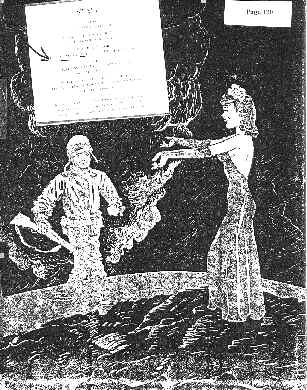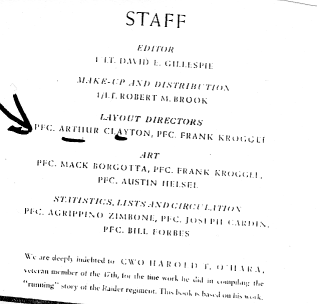
 "GOT IT MADE"
"GOT IT MADE" 
 "GOT IT MADE"
"GOT IT MADE" When a fellow has a good job in the army he "has it made." That's just what I had when I moved into Dachau to join the PRO staff. My job was to help issue the weekly regimental paper, The Raider, and I was right at home! Writing news, headlines, laying out the four-page paper, and working about two days out of the week in Munich with the German printers was a far cry from roadblocks and drilling. Three of us from the staff, Montgomery, Whitehead and I lived on the third floor of the headquarters company CP, no guard, no reveille or retreat, no formations of any kind. Just go to work in the morning (by Jeep, of course) and come home in the evening. It was a great life.
But on Oct. 12 things began to happen fast. Ralph (Whitehead) got a furlough to England, Montgomery shipped out on his way home -- and the Lieutenant and I were holding the sack. I became editor and did most of the work in getting the week's paper out. Saturday I was told I would be leaving Wednesday (Oct. 24) for the 71st division, a temporary occupation outfit which would be going home in a few months -- I hoped.
 So it looked as if I were going to be editor of the
Raider one week and one week only.....but....at the last
minute Col. Ward stepped into the picture, said I might
as well stay with the 47th until the 71st was ready to
ship, and pulled the right strings to have me placed on
"detached service" from the 71st. That pleased me
because I knew I had a good job with PRO, and I
didn't know what I might be assigned to in a new unit --
nor did I know when the 71st was going home, next
month or six months from then.
So it looked as if I were going to be editor of the
Raider one week and one week only.....but....at the last
minute Col. Ward stepped into the picture, said I might
as well stay with the 47th until the 71st was ready to
ship, and pulled the right strings to have me placed on
"detached service" from the 71st. That pleased me
because I knew I had a good job with PRO, and I
didn't know what I might be assigned to in a new unit --
nor did I know when the 71st was going home, next
month or six months from then.
So I remained as editor of The Raider and with our regimental history taking up most of Lt. Gillispie's time, the paper became more and more my entire responsibility. Twice more I was cancelled from the shipping list, and November slipped by, a month filled with football games and long jeep trips to cover them. From Dec. 1 to 5, I traveled with the regimental grid team to Vienna, famous city of Austria. Here, aside from the main event of our trip, a football game, we were guests at several swanky floor shows, sold cigarettes for $80 a carton to the civilians, and toured the historic areas of the city.
Christmas came and went and still the final "must" order had not come for me from the 71st. But on Jan. 14, 1946, I was called to the 14th regiment of the Red Circle division and left Dachau and Munich behind. For the first time in my Army career I hated to leave a place but this feeling was tempered by the hope that I would be soon on my way back to the states--and home.
 In the 14th, located at Memmingen, Germany, I was immediately placed under I & E and was assigned to the
staff of the regimental newspaper, which was just being started. Three men were on the staff, Pfc. William
Heath, editor, myself, associate editor, and S/Sgt. John Eriksen, as artist and reporter. Lacking cooperation
from the regimental commander and continually running into publishing difficulties, none of us had our heart in
our work but the first issues came off the press and the new paper was on its way. At the end of the second
week, however, Heath and Eriksen received notice they were shipping out the next Thursday. I finished the
paper, the third issue and its last, and went to work in regimental S-1 office as a clerk typist, awaiting time for
my shipping orders which were expected soon.
In the 14th, located at Memmingen, Germany, I was immediately placed under I & E and was assigned to the
staff of the regimental newspaper, which was just being started. Three men were on the staff, Pfc. William
Heath, editor, myself, associate editor, and S/Sgt. John Eriksen, as artist and reporter. Lacking cooperation
from the regimental commander and continually running into publishing difficulties, none of us had our heart in
our work but the first issues came off the press and the new paper was on its way. At the end of the second
week, however, Heath and Eriksen received notice they were shipping out the next Thursday. I finished the
paper, the third issue and its last, and went to work in regimental S-1 office as a clerk typist, awaiting time for
my shipping orders which were expected soon.


On Feb. 15, I was transferred to the 66th regiment of the 71st and thus began more than a month of the old grind -- freezing in trucks and freight cars, sleeping on
floors in wrecked buildings, eating K rations, wading mud, and forever cursing the Army. First we went to Kaufbeuren (I had been here before on my way back
from the hospital in May), then by freight cars through Munich to Regensberg; a day in the mud and cold there and then in trucks to Deggensdorf -- farther and
farther from the nearest shipping port!
From THE BRUNSWICKER, Brunswick, Missouri
Arthur Clayton, former editor of The Brunswicker, thinks he may get home from Europe "some time."
Art was for quite a long time stationed at Dachau, one of the German horror camps. He and Ronald Peveler met while both were at this same location. Ronald has been home now for several months.
While at Dachau, Art reported on the regimental paper for some time and later became editor. He served in this capacity until transferred to another outfit. Here again he was given work on the regimental paper but only helped with a few issues before being transferred again -- supposedly each transfer being somewhat closer to home.
His last letter, dated February 20, and just received was written from Deggendorf, Germany. Part of the letter is quoted here:
"Last Friday (not a week ago yet) I left Memmigen, went to Kaufbeuren. Sunday we took box cars to Reggensberg, going through Munich (good old Munich) and near Dachau. Tuesday (yesterday) we loaded into trucks and came here--Deggendorf. Still further from port!
This morning we learned our 'mission' here -- one more job before going home. There is a Russian DP camp here -- Russians who fought with the Germans. They are now wanted in Russia as traitors. Rather than go home (if they learn they are going) they will kill themselves. We are supposed to swoop down on the camp one of these dark nights, surprise them out of bed, take all knives, razors, and pistols, etc., away from them before they have a chance to use them on themselves. Nice, huh! All we will be armed with are clubs. The idea is to keep the Russians alive!
Until the raid we 'train' for hand-to-hand combat, etc. I thought the war was over! But it is very unlikely anyone but Russians will be hurt--and then only if they try to kill themselves.
No need to tell you how we are living--like tramps again, cold, muddy, disgusted. Sleeping in an old mill on the outskirts of town, rotten chow, cold rooms, most of us sleeping on the floor. Sometimes it seems almost more than a guy can stand, but it will end sometime.
As soon as the raid is over we are supposed to leave for Coburg, where we will begin processing for shipment. Sometime after March 10, we should start home. Should, I say.
Later: Two of my roommates and I just slipped out and walked into Deggendorf to the Red Cross club. A long hike but it sure is nice to get out of that hole and relax in a clean, warm place. Think maybe we'll just stay in town and see a show. Chow isn't any good at the company anyway. We just eat doughnuts at the ARC.
This is just exactly the same thing I was going through a year ago last November -- except I was going the other way. We're practically 'lost sheep' again and get shoved around like a bunch of criminals by service units. But, as I said before, this time the end (Coburg,) will be much better!
Guess this is all for now.
Love to all,
Art.
From Ed DeFoe, December 18, 1991:
Ref: Page 61 MUD & GUTS
I and all the other guys were shipped to the 71st. They had not seen combat so our war stories even became unbelievable to us. We went to Willheim,
Germany, not far from Munich. To make a short story shorter -- I opened up a service club in an old hotel... even had a jeep and driver, also had charge
of a truck to haul the beer, also two or four bartenders, 12 waitresses, a couple of GI bouncers, a room of my own in the hotel....and get this, Art, even a
nice old lady to draw my bath and lay out clean clothes. Oh, yes! Hired a band, not real good, but loud. Trouble was, by the time midnight came, they
(the band) were drunk and maybe one guy would play and we would sing or whatever. Yes, we even made money. That went on for about a month...talk
about living high on the hog!
The night before we got shipped out I threw a party with everything free...lots of cheese, lots of beer, everything, even the glasses or whatever -- spent
every thing we made!
From Raymond Crabtree, February 1963:
...after I left the hospital where you saw me last, they sent me to another hospital in Nancy, France. From there I went to two different hospitals in Paris
where I saw Black. From there I went to a hospital on the canal in France and from there to Belleford, England. I came to Camp Kilmer, New Jersey,
and from there to Oklahoma, close to Tulsa. From there I went to Chickasaw, Okla., and was discharged October 7, 1945
From Ed DeFoe, December 1991:
...We boarded a train and travelled for a full night and a full day ...stopped in Munich, 20 miles away from where we started. There we joined up with an
Engineer outfit (2527th), went up to Frankfurt, then on a Victory ship and Camp Mead, then to a camp in Wisconsin and then home. I think it was the
end of February, 1946.
What was the guy's name who came from Boston? Not very tall, kind of a round face, always real cheerful. I think he was kind of a small-time hood....I
asked him that one time and he said, "Yes." Anyway, he was with us to the end...we had to wait for him when we pulled out (by truck) to go home.
One more thing about the bar at Willheim....we drank with Krauts almost every evening. They came in early in the evening 'cause there was a curfew for
them. Anyway, no trouble, not one time, we bought them beer and a mutual pat on the back. I guess GIs are just "good Joes." They didn't want to fight
any more than we did.....
Title Page Previous Page Next Page
This page maintained by Bruce Clayton.
Copyright © 2008 by Bruce D. Clayton, All rights reserved.